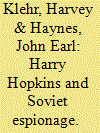|
|
|
Sort Order |
|
|
|
Items / Page
|
|
|
|
|
|
|
| Srl | Item |
| 1 |
ID:
134059


|
|
|
|
|
| Publication |
2014.
|
| Summary/Abstract |
One of the intriguing unidentified cover names in the Venona decryptions released in the mid-1990s was '19', a Soviet source senior enough to report taking part in a conversation with President Roosevelt, Prime Minister Churchill, and Vice-President Wallace at the 1943 Trident conference. While some historians thought the evidence too ambiguous to identify the real name behind '19', others built a case that it was presidential adviser Harry Hopkins. Alexander Vassiliev's notebooks, made public in 2009, resolved the issue by firmly identifying '19' as State Department official Laurence Duggan. There remain, however, writers who refuse to accept the evidence that '19' was Duggan and insist that Hopkins was a Soviet agent on the basis of insubstantial evidence.
|
|
|
|
|
|
|
|
|
|
|
|
|
|
|
|
| 2 |
ID:
188265


|
|
|
|
|
| Summary/Abstract |
After the Bolsheviks consolidated their newly won power, they looked toward the Western democracies to achieve additional victories. Under cover of diplomatic recognition, trade agreements, and local communist parties, Soviets sent numerous clandestine agents abroad to pursue national security objectives, including theft of military and industrial secrets on a large scale. France, Britain, and the United States were the main targets in which, organizationally, Soviet intelligence used a consistent pattern. As an existential threat, France was the first priority until displaced by the fear of German rearmament. France represented a rich resource for advanced military and industrial technology that the Soviets needed to transform Russia’s infrastructure. In 1935, France and Russia signed a mutual defense pact that effectively ended Soviet espionage in France.
|
|
|
|
|
|
|
|
|
|
|
|
|
|
|
|
| 3 |
ID:
191883


|
|
|
|
|
| Summary/Abstract |
During the Cold War, France remained a soft touch for Soviet intelligence. Among the large communist population—war veterans and about 25% of the postwar electorate—Soviets found fertile ground for recruiting agents and collaborators who would betray their country, although it is fair to say most philosophical and political communists did not engage in espionage. Spy rings led by the State Committee for Security (KGB) and Main Intelligence Directorate (GRU) controllers in the Russian embassy’s rezidence overwhelmed French security precautions. In addition, the Soviet espionage apparatus maintained an extensive infrastructure in the Moscow Center that supported quantitative intelligence collected in France on a massive scale. The addition of agents from satellite countries stretched French counterintelligence beyond its limits. All this is not to say that French security was completely ineffective. Security agencies unmasked spies and arrested hundreds for espionage; so too, hundreds of Soviets with diplomatic immunity were expelled. French security also benefited from consequential defections of Soviet agents and the crowning but fortuitous achievement of a mole inside the KGB itself. But poor French security exacerbated deteriorating relations with the United States and compromised North Atlantic Treaty Organization secrets. Regardless of the détente between East and West, Soviet espionage continued unabated.
|
|
|
|
|
|
|
|
|
|
|
|
|
|
|
|
| 4 |
ID:
141629


|
|
|
|
|
| Summary/Abstract |
In June 1967, the Soviet Union abruptly cut off diplomatic relations with Israel and withdrew its embassy staff from Tel-Aviv, including its large KGB Rezidentura. To develop new sources of intelligence in Israel, the KGB recruited under duress hundreds of Russian Jews to spy in Israel in return for allowing their families to leave the Soviet Union. Most of these ‘recruits’ abandoned their task once they reached Israel, leaving Soviet intelligence with only a small number of agents in Israel who were handled by KGB illegal case officers working out of Russian churches. These agents were able to make careers in Israel and obtain some access to confidential military information, but generally failed to reach Israel's inner circle of political and military decision makers. This inner circle was only breached in 1983 by the treachery of a highly placed former Mossad officer who offered his services to the Soviets and became the KGB's best source for secret information deep inside the Israeli government.
|
|
|
|
|
|
|
|
|
|
|
|
|
|
|
|
| 5 |
ID:
139428


|
|
|
|
|
| Summary/Abstract |
Broken down by occupation, more American journalists worked clandestinely for Soviet intelligence in the United States during the early 1940s than in any other profession except engineering. However, since reporters had no direct access to government secrets, most research focuses on their role as messengers, recruiters, and sources of inside information. While not discounting these roles, this article argues that journalist spies also collected a large amount of secret diplomatic and military information. Covering the years 1941 through 1946, this article also shows that the information collected by these spies evolved as World War II morphed into the Cold War.
|
|
|
|
|
|
|
|
|
|
|
|
|
|
|
|
|
|
|
|
|